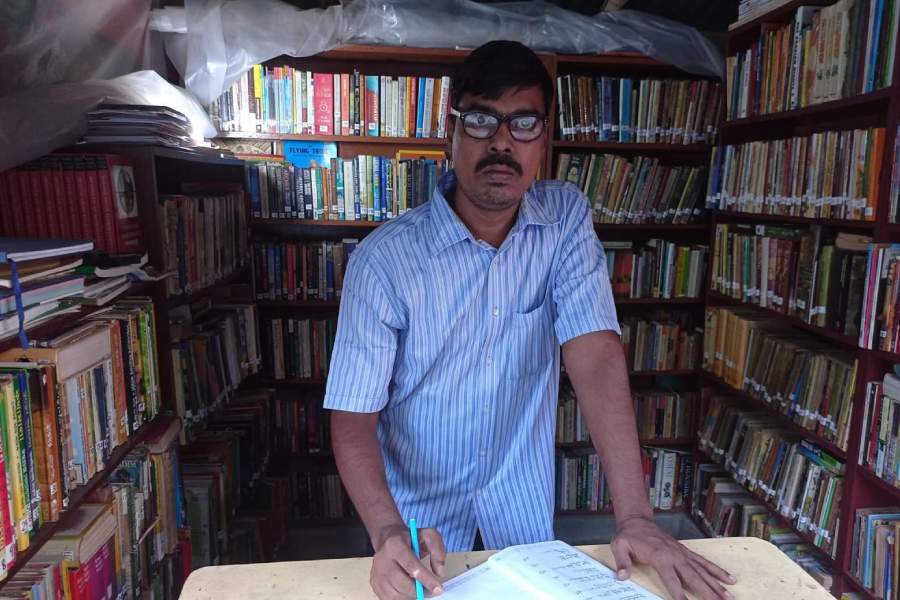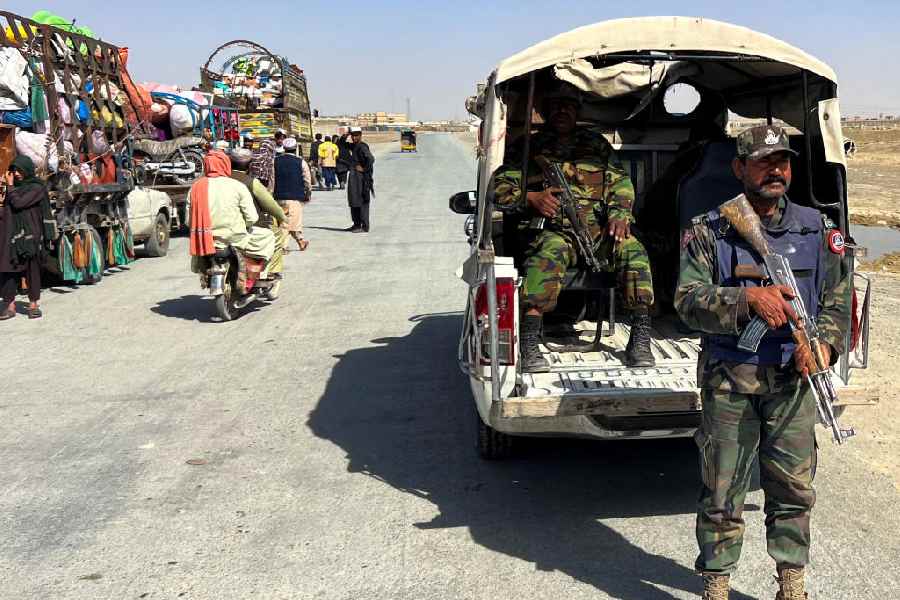 Sunday, 01 March 2026
Sunday, 01 March 2026
 Sunday, 01 March 2026
Sunday, 01 March 2026
Palestinian detainees recently released back to Gaza have told the BBC they suffered mistreatment and torture while in Israeli military and prison custody.
Their accounts add to mounting reports of alleged misconduct within Israel’s detention facilities. One former detainee claimed he was doused with chemicals and set on fire.
“I thrashed around like an animal trying to put out the flames on my body,” recalled Mohammad Abu Tawileh, a 36-year-old mechanic.
The BBC interviewed five former detainees, all of whom were arrested in Gaza in the months following the October 7 attacks, during which Hamas and other armed groups killed approximately 1,200 people in Israel and took 251 hostages.
The men were detained under Israel's Unlawful Combatants Law, which permits the indefinite detention of individuals deemed security threats without formal charges. The move comes as part of Israel's broader efforts to recover hostages and dismantle the designated terrorist organisation.
Accused of ties to Hamas
The men reported being accused of ties to Hamas and interrogated about the whereabouts of hostages and tunnel networks. However, they were not found to have participated in the 7 October 2023 attacks—a key criterion set by Israel for release under the recent ceasefire agreement.
Some of those released under the deal had been serving sentences for serious offenses, including the killing of Israelis.
They reached out to the Israel Defense Forces (IDF) and the Israel Prison Service (IPS) to inquire about any convictions or allegations involving these men, but both declined to comment.
'Stripped, blindfolded'
In the men’s testimony, they each described harrowing accounts of abuse during their detention, alleging they were stripped, blindfolded, handcuffed, and subjected to severe beatings.
Some reported being electrocuted, threatened by dogs, and denied access to medical treatment. A few claimed to have witnessed the deaths of fellow detainees. One man said he saw incidents of sexual abuse, while another described having his head submerged in chemicals and his back set on fire.
These testimonies have been supported in part by reports from a lawyer who visited two of the detainees in prison, as well as by medical staff who treated some of the men upon their release.
The BBC sent a detailed right of reply to the Israel Defense Forces (IDF), outlining the full extent of the allegations and identifying the individuals involved.
IDF's denial
In response to serious allegations reported by the BBC, the Israel Defense Forces (IDF) denied any claims of systematic abuse of detainees, stating it “completely rejects accusations of systematic abuse”.
While the IDF did not directly address the specific cases cited in the report, it said some of the incidents mentioned would be reviewed by “the relevant authorities”. However, it maintained that other allegations lacked sufficient detail — including the identities of the detainees involved — rendering them "impossible to examine".
“The IDF takes any actions which contradict its values very seriously,” the statement read. “Specific complaints about inappropriate behaviour by detention facility staff or insufficient conditions are forwarded for examination by the relevant authorities and are dealt with accordingly.” It further added that, where appropriate, disciplinary measures are taken and criminal investigations initiated.
Meanwhile, the Israel Prison Service (IPS) said it had no knowledge of any such incidents occurring within its jurisdiction. “As far as we know, no such events have occurred under IPS responsibility,” the agency said.
Dr Lawrence Hill-Cawthorne, co-director of the Centre for International Law at the University of Bristol, said the accounts of mistreatment shared by the detainees are “completely at odds with both international and Israeli law” and, in some instances, could amount to torture.
“International law, particularly the law of armed conflict, mandates the humane treatment of all detainees,” he stated. “Even if wrongdoing is alleged, the basic rights and needs of detainees must be upheld without exception.”
Earlier this year, five Palestinians interviewed in depth were released as part of a ceasefire agreement between Israel and Hamas — the group behind the 7 October 2023 attacks on Israel.
They were among approximately 1,900 Palestinian prisoners and detainees exchanged for 33 Israeli hostages. Of the hostages, eight were returned dead and 25 alive, several of whom have recounted harrowing experiences of abuse, starvation, and threats during their captivity.
Female hostages previously released have also alleged instances of physical and sexual assault while in Hamas custody.
Israeli authorities have claimed that forensic tests indicate some of the hostages returned during the recent ceasefire, including children, were killed by Hamas. The group has denied the allegation.
Meanwhile, the recently released Palestinian detainees recounted a disturbing pattern of abuse, stating they were arrested in Gaza, transported to Israeli military barracks, later moved to prisons, and eventually released back to Gaza after several months. They allege they were mistreated at every stage of their detention.
Prolonged hunger, unsanitary conditions
More than a dozen other former detainees also spoke of physical assaults, prolonged hunger, and unsanitary conditions that led to disease. Their accounts are consistent with previous testimonies gathered by Israeli human rights organization B’Tselem and the United Nations.
A UN report published in July detailed harrowing claims from former detainees, including being stripped naked, denied food, water, and sleep, subjected to electric shocks and cigarette burns, and attacked by dogs.
A further report by UN experts last month documented instances of rape, sexual assault, and threats of such violence, describing their use as a “standard operating procedure” by Israeli forces—a claim that Israel has strongly denied, calling the allegations “categorically unfounded.”
The Palestinian men recounted their experiences, all alleging that the abuse began from the moment of their arrest. They described being stripped, blindfolded, and beaten before being taken into custody.
Among them was Mohammad Abu Tawileh, a mechanic, who said he was detained by Israeli forces in March 2024 and subjected to days of torture. According to his account, soldiers transported him to a nearby building where he was held alone for three days and interrogated by troops.
'Head forced into cleaning chemicals'
He alleged that the soldiers mixed cleaning chemicals into a pot and forced his head into it. He was then punched and fell to the floor, sustaining an eye injury, which he says was exacerbated when troops covered it with a cloth.
More harrowingly, he claimed soldiers used an air freshener and lighter to set his back on fire. "I thrashed like an animal to put it out," he recalled, describing how the flames spread from his neck to his legs. "Then they beat me repeatedly with rifle butts and sticks, poking me in the sides."
Abu Tawileh further alleged that acid was poured on him. “They poured it on my head, and it trickled down my body as I sat on the chair,” he said. This lasted for over a day, he claimed, before water was finally poured over him.
He said he was then transferred to Israel for medical treatment, which included skin grafts, most of which took place at a field hospital at Sde Teiman barracks near Beersheba. While there, he was allegedly cuffed naked to a bed and made to use a diaper instead of being given access to a toilet.
The Israeli military has not responded directly to the individual allegations but maintains that all detainees are treated in accordance with international law and that any claims of misconduct are thoroughly investigated.
Upon Abu Tawileh’s release, his back was marked with red welts, and he reported ongoing pain from burns that disrupted his sleep and affected his vision. A specialist eye doctor in Gaza later confirmed he had suffered a chemical burn to the eye and noted signs of visual deterioration, possibly from chemical exposure or blunt trauma.
UK-based medical experts who reviewed images of his injuries found them consistent with his account, though acknowledged limitations due to the lack of direct clinical examination.
The BBC presented Abu Tawileh’s testimony to the Israel Defense Forces (IDF), allowing five days for a response. While the IDF did not address his specific allegations, it stated that any actions contradicting its values were taken "very seriously" and that it would “examine” certain cases. However, it did not confirm whether Abu Tawileh's case was among them.
Other former detainees echoed similar claims. Abdul Karim Mushtaha, a 33-year-old poultry worker, described being beaten, humiliated, and denied water after his arrest at an Israeli checkpoint in November 2023, while evacuating with his family. A lawyer’s report noted he had endured severe mistreatment and was stripped before being transferred to prison.
Some detainees claimed they were left outside in freezing temperatures for hours, and alleged that Israeli soldiers stole their personal belongings.
IDF responds, finally
The IDF, in response to the BBC’s queries regarding theft allegations, said such acts were “contrary to the law and IDF values,” adding that it would “thoroughly” examine the cases if more specific information was provided.
All the detainees interviewed—including Mushtaha—were reportedly transferred to Sde Teiman, where Abu Tawileh also received medical treatment.
One man, using the pseudonym "Omar" for safety reasons, said he was insulted and spat on during the transfer. Soldiers allegedly taunted detainees with phrases like “sons of pigs” and played recordings threatening retaliation.
Sde Teiman has been previously flagged for detainee mistreatment.
In February, several soldiers stationed there were charged after a detainee was hospitalised with severe internal injuries. In a separate case, a soldier was convicted of aggravated abuse against Palestinian detainees.
Three of the men interviewed also alleged that muzzled dogs were used to intimidate them during transfers to clinics or interrogation rooms. “They’d set the dogs on us, tighten our cuffs, and beat us,” Abu Tawileh claimed.
The BBC sought a response from the IDF regarding the reported use of dogs to threaten and attack detainees. In response, the military said, “The use of dogs to harm detainees is prohibited,” and added that some detainees were “experienced terrorists considered to be very dangerous,” with “extended shackling” permitted only in “exceptional cases.”
However, several former detainees painted a disturbing picture of the conditions they faced while detained.
“We would be sitting on our knees from 5 a.m. until 10 p.m., when it was time to sleep,” said Abu Tawileh, describing the use of physically punishing stress positions. Hamad al-Dahdouh, a 44-year-old former farmer, said beatings at the barracks “targeted our heads and sensitive areas like the eyes and ears.” He claimed to have sustained temporary damage to his back and ears, and suffered a fractured rib cage.
The IDF did not respond to these specific claims.
'You are a terrorist'
Al-Dahdouh and other detainees also alleged that electric shocks were used during interrogations. “The oppression units would bring dogs, sticks, and stun guns. They would electrocute and beat us,” he recounted.
Another detainee, Mushtaha, said they were frequently accused of being affiliated with Hamas and held responsible for the 7 October attacks. “Anyone who was imprisoned… they said: ‘You are a terrorist,’” he said. “They always tried to tell us that we had taken part in the October 7 attacks. They all had a grudge.”
Mushtaha described being subjected to sleep deprivation and exposure to cold during overnight interrogations. “For three nights, I couldn’t sleep because they were torturing me,” he said. “Our hands were tied and put above our heads for hours. We weren’t wearing anything. Any time you would say ‘I’m cold,’ they would fill a bucket with cold water, pour it on you and switch on the fan.”
No legal representation
Detainees said they were denied access to legal representation and told that no time would be given for a legal challenge. “They told us: ‘If you are from Gaza, you are affiliated with terrorist groups,’” said al-Dahdouh.
When detainees asked if they could challenge this in court they were told there was no time for that. He said he was not given access to a lawyer.
The Israel Defense Forces (IDF) reiterated that Israeli law provides detainees with judicial safeguards, including the right to legal representation, judicial review by a civil district court, and the ability to appeal to the Supreme Court.
One former detainee, "Omar", told that upon his arrival at the Sde Teiman detention facility, he was subjected to three days of interrogation. He described being held in a freezing room, dressed in thin overalls, with loudspeakers playing Israeli music around the clock.
"When the questioning ended, we were blindfolded and taken back to the barracks," Omar said. "We couldn't tell if it was day or night. You don’t see the sun. You don’t see anything."
The IDF stated that it maintains oversight mechanisms, including closed-circuit television, to ensure detention facilities operate in compliance with legal and military standards.
Severe interrogation and inhumane treatment
One detainee, identified as Omar, described enduring three days of interrogation in freezing conditions, deprived of sunlight and sleep.
Both Omar and another detainee, Mushtaha, recounted being subjected to violent “welcoming ceremonies” involving physical assault and sexual humiliation after being transferred to Ketziot Prison.
The Palestinian Prisoners Society and Israeli rights group B’Tselem reported cases of forced nudity, sexual violence, and denial of medical care, though official complaints on forced sexual acts between detainees remain limited. The Israel Prison Service (IPS) denied the allegations, asserting detainees are treated lawfully and monitored.
Despite this, the detainees detailed harrowing conditions — beatings with batons, use of Tasers, threats of castration, and boiling water being poured on inmates.
Requests for medical aid were reportedly ignored or met with further violence. Food and hygiene were severely lacking, with some detainees suffering infections, weight loss, and scabies. In Megiddo, 17-year-old Ahmed Abu Seif described torture, including forced toenail removal and dog attacks.







